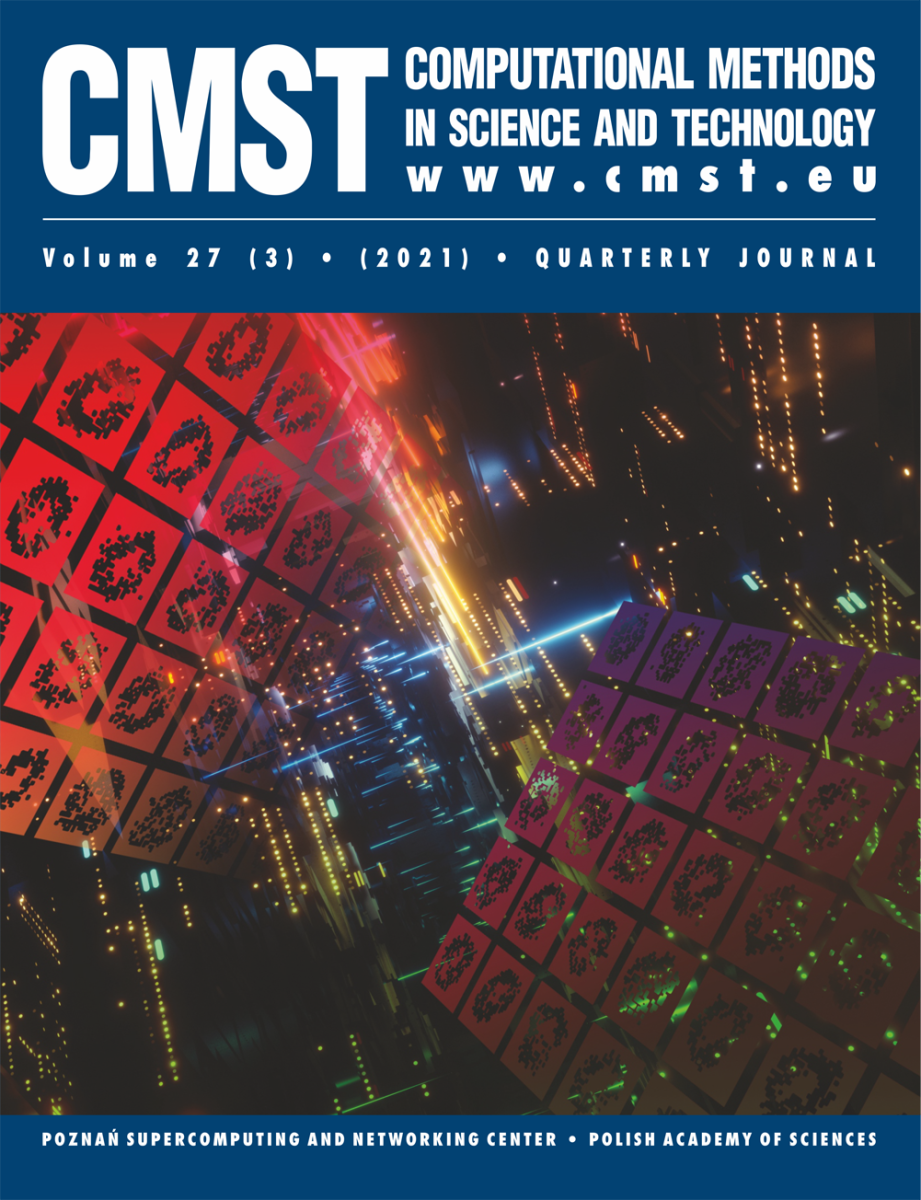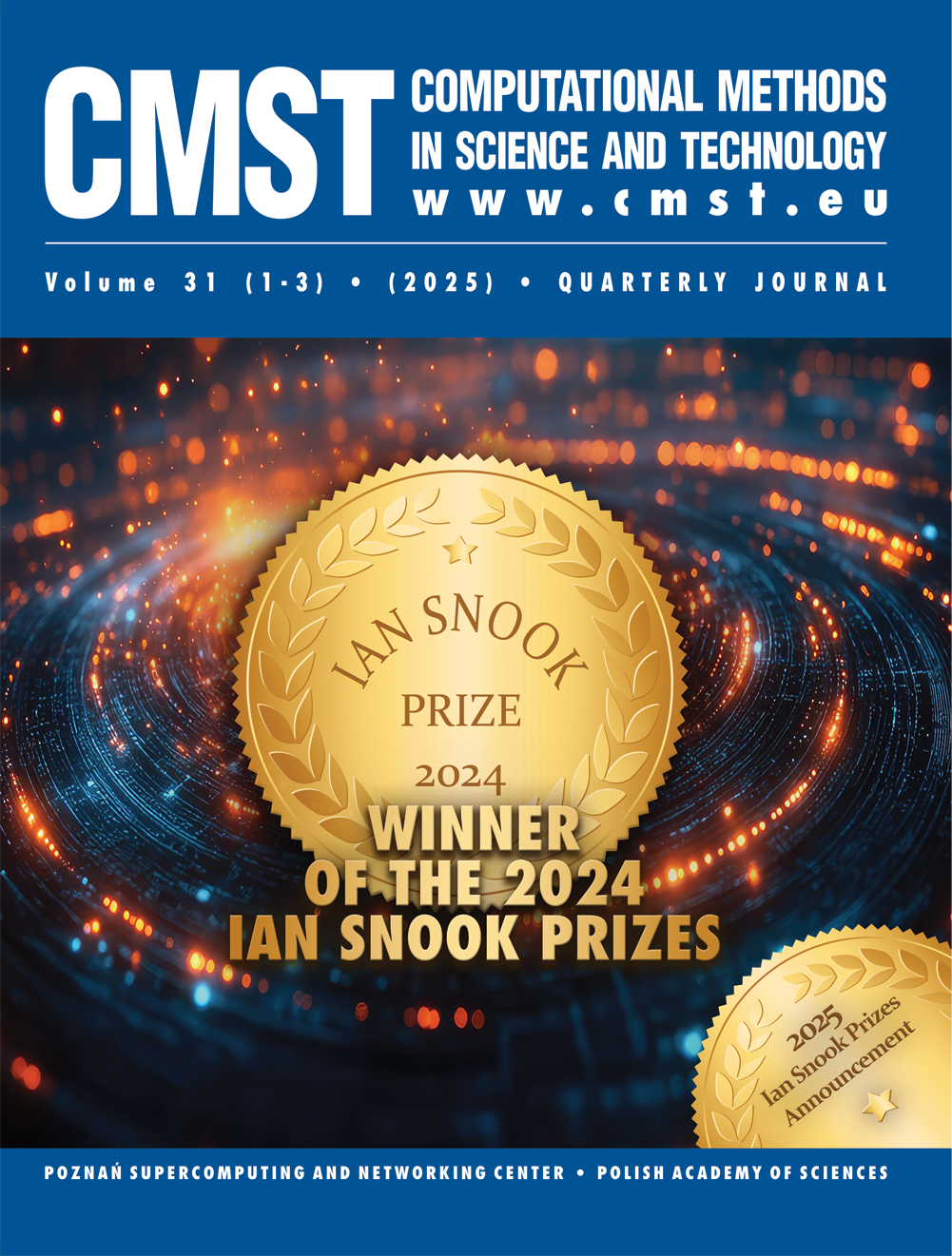6 +∞ New Expressions for the Euler-Mascheroni Constant
Cardinal Stefan Wyszynski University
Faculty of Mathematics and Natural Sciences
ul. Wóycickiego 1/3, PL-01-938 Warsaw, Poland
E-mail: m.wolf@uksw.edu.pl
Received:
Received: 4 June 2025; revised: 30 July 2025; accepted: 31 July 2025; published online: 27 August 2025
DOI: 10.12921/cmst.2025.0000010
Abstract:
In the first part, we review some formulae for the Euler-Mascheroni constant γ. For four of these formulae, we present a comparison of computer determinations of these expressions with the actual value of γ. Next, we provide new formulae expressing the γ constant in terms of the Ramanujan-Soldner constant µ. By employing the cosine integral, we obtain another infinity of formulae for γ. Finally, we express γ in terms of π.
Key words:
cosine integral, Euler-Mascheroni constant, Ramanujan-Soldner constant
References:
[1] J. Havil, Gamma: Exploring Euler’s Constant, Princeton University Press, Princeton, NJ (2003).
[2] J.C. Lagarias, Euler’s constant: Euler’s work and modern developments, Bulletin of the American Mathematical Society 50(4), 527–628 (2013).
[3] J. Sondow, Criteria for Irrationality of Euler’s Constant, Proceedings of the American Mathematical Society 131(11), 3335–3345 (2003).
[4] D.W. DeTemple, A quicker convergence to Euler’s constant, The American Mathematical Monthly 100(5), 468–470 (1993).
[5] C. Mortici, On new sequences converging towards the Euler-Mascheroni constant, Computers and Mathematics with Applications 59(8), 2610–2614 (2010).
[6] X. Gourdon, P. Sebah, Collection of formulae for the Euler constant (2008), http://numbers.computation.free.fr/Constants/Gamma/gammaFormulas.pdf.
[7] J. Choi, H.M. Srivastava, Integral Representations for the Euler-Mascheroni Constant γ, Integral Transforms and Special Functions 21(9), 675–690 (2010).
[8] G. Boros, V. Moll, Irresistible Integrals: Symbolics, Analysis and Experiments in the Evaluation of Integrals, Cambridge University Press (2004).
[9] R.P. Brent, E.M. McMillan, Some New Algorithms for High-Precision Computation of Euler’s Constant, Mathematics of Computation 34(149), 305–312 (1980).
[10] K. Broughan, Equivalents of the Riemann Hypothesis, volume 1 and 2, Cambridge University Press (2017).
[11] G.H. Hardy, E.M. Wright, An Introduction to the Theory of Numbers, Oxford Science Publications (1980).
[12] M.W. Coffey, The stieltjes constants, their relation to the ηj coefficients, and representation of the Hurwitz zeta function, Analysis (Oldenbourg Wissenschaftsverlag) 30 (2010).
[13] H.M. Edwards, Riemann’s zeta function, Pure and Applied Mathematics 58, Academic Press (1974).
[14] H. Davenport, Multiplicative Number Theory, Graduate Texts in Mathematics 74, Springer-Verlag, New York (1980).
[15] Rubinstein’s, L-function calculator, http://doc.sagemath.org/html/en/reference/lfunctions/sage/lfunctions/lcalc.html.
[16] S.K. Sekatskii, S. Beltraminelli, D. Merlini, On equalities involving integrals of the logarithm of the Riemann ζ-function and equivalent to the Riemann hypothesis, Ukrainian Mathematical Journal 64(2), 247–261 (2012).
[17] C. Pomerance, Recent developments in primality testing, The Mathematical Intelligencer 3(3), 97–105 (1981).
[18] S.S. Wagstaff, Divisors of Mersenne Numbers, Mathematics of Computation 40(161), 385–397 (1983).
[19] M.R. Schroeder, Number Theory In Science And Communication, With Applications In Cryptography, Physics, Digital Information, Computing, And Self-Similarity, Springer-Verlag New York, Inc (2006).
[20] D.W. Sweeney, On the Computation of Euler’s Constant, Mathematics of Computation 17(82), 170 (1963).
[21] A. Kawalec, Asymptotic formulas for harmonic series in terms of a non-trivial zero on the critical line, Computational Methods in Science and Technology, 161–166 (2019).
[22] M. Abramowitz, I.A. Stegun, Handbook of Mathematical Functions with Formulas, Graphs, and Mathematical Tables, Dover, New York (1964).
[23] B. Riemann, Gesammelte Mathematische Werke, Wissenschaftlicher Nachlass und Nachträge – Collected Papers, Springer-Verlag, Berlin, Heidelberg (1991).
[24] B.C. Berndt, Ramanujan’s Notebooks, Part IV, Springer Verlag (1994).
[25] PARI/GP, version 2.3.0, 64 bits (2018), http://pari.math.u-bor deaux.fr/.
[26] W. Rudin, Principles of mathematical analysis, McGraw-Hill Book Co., New York (1976).
[27] N.I. Fel’dman, A.B. Shidlovskii, The development and present state of the theory of transcendental numbers, Russian Mathematical Surveys 22(3), 1–79 (1967).
[28] A.J. MacLeod, Asymptotic expansions for the zeros of certain special functions, Journal of Computational and Applied Mathematics 145(2), 261–267 (2002).
[29] B.C. Berndt, Ramanujan’s Notebooks, Part I, Springer Verlag (1985).
[30] V.S. Adamchik, S. Wagon, π: A 2000-year search changes direction, Mathematica in Education and Research 5(1), 11–19 (1996).
[31] H. Cohen, R. Villegas, F. Fernando, D. Zagier, Convergence acceleration of alternating series, Experiment. Math. 9(1), 3–12 (2000).
In the first part, we review some formulae for the Euler-Mascheroni constant γ. For four of these formulae, we present a comparison of computer determinations of these expressions with the actual value of γ. Next, we provide new formulae expressing the γ constant in terms of the Ramanujan-Soldner constant µ. By employing the cosine integral, we obtain another infinity of formulae for γ. Finally, we express γ in terms of π.
Key words:
cosine integral, Euler-Mascheroni constant, Ramanujan-Soldner constant
References:
[1] J. Havil, Gamma: Exploring Euler’s Constant, Princeton University Press, Princeton, NJ (2003).
[2] J.C. Lagarias, Euler’s constant: Euler’s work and modern developments, Bulletin of the American Mathematical Society 50(4), 527–628 (2013).
[3] J. Sondow, Criteria for Irrationality of Euler’s Constant, Proceedings of the American Mathematical Society 131(11), 3335–3345 (2003).
[4] D.W. DeTemple, A quicker convergence to Euler’s constant, The American Mathematical Monthly 100(5), 468–470 (1993).
[5] C. Mortici, On new sequences converging towards the Euler-Mascheroni constant, Computers and Mathematics with Applications 59(8), 2610–2614 (2010).
[6] X. Gourdon, P. Sebah, Collection of formulae for the Euler constant (2008), http://numbers.computation.free.fr/Constants/Gamma/gammaFormulas.pdf.
[7] J. Choi, H.M. Srivastava, Integral Representations for the Euler-Mascheroni Constant γ, Integral Transforms and Special Functions 21(9), 675–690 (2010).
[8] G. Boros, V. Moll, Irresistible Integrals: Symbolics, Analysis and Experiments in the Evaluation of Integrals, Cambridge University Press (2004).
[9] R.P. Brent, E.M. McMillan, Some New Algorithms for High-Precision Computation of Euler’s Constant, Mathematics of Computation 34(149), 305–312 (1980).
[10] K. Broughan, Equivalents of the Riemann Hypothesis, volume 1 and 2, Cambridge University Press (2017).
[11] G.H. Hardy, E.M. Wright, An Introduction to the Theory of Numbers, Oxford Science Publications (1980).
[12] M.W. Coffey, The stieltjes constants, their relation to the ηj coefficients, and representation of the Hurwitz zeta function, Analysis (Oldenbourg Wissenschaftsverlag) 30 (2010).
[13] H.M. Edwards, Riemann’s zeta function, Pure and Applied Mathematics 58, Academic Press (1974).
[14] H. Davenport, Multiplicative Number Theory, Graduate Texts in Mathematics 74, Springer-Verlag, New York (1980).
[15] Rubinstein’s, L-function calculator, http://doc.sagemath.org/html/en/reference/lfunctions/sage/lfunctions/lcalc.html.
[16] S.K. Sekatskii, S. Beltraminelli, D. Merlini, On equalities involving integrals of the logarithm of the Riemann ζ-function and equivalent to the Riemann hypothesis, Ukrainian Mathematical Journal 64(2), 247–261 (2012).
[17] C. Pomerance, Recent developments in primality testing, The Mathematical Intelligencer 3(3), 97–105 (1981).
[18] S.S. Wagstaff, Divisors of Mersenne Numbers, Mathematics of Computation 40(161), 385–397 (1983).
[19] M.R. Schroeder, Number Theory In Science And Communication, With Applications In Cryptography, Physics, Digital Information, Computing, And Self-Similarity, Springer-Verlag New York, Inc (2006).
[20] D.W. Sweeney, On the Computation of Euler’s Constant, Mathematics of Computation 17(82), 170 (1963).
[21] A. Kawalec, Asymptotic formulas for harmonic series in terms of a non-trivial zero on the critical line, Computational Methods in Science and Technology, 161–166 (2019).
[22] M. Abramowitz, I.A. Stegun, Handbook of Mathematical Functions with Formulas, Graphs, and Mathematical Tables, Dover, New York (1964).
[23] B. Riemann, Gesammelte Mathematische Werke, Wissenschaftlicher Nachlass und Nachträge – Collected Papers, Springer-Verlag, Berlin, Heidelberg (1991).
[24] B.C. Berndt, Ramanujan’s Notebooks, Part IV, Springer Verlag (1994).
[25] PARI/GP, version 2.3.0, 64 bits (2018), http://pari.math.u-bor deaux.fr/.
[26] W. Rudin, Principles of mathematical analysis, McGraw-Hill Book Co., New York (1976).
[27] N.I. Fel’dman, A.B. Shidlovskii, The development and present state of the theory of transcendental numbers, Russian Mathematical Surveys 22(3), 1–79 (1967).
[28] A.J. MacLeod, Asymptotic expansions for the zeros of certain special functions, Journal of Computational and Applied Mathematics 145(2), 261–267 (2002).
[29] B.C. Berndt, Ramanujan’s Notebooks, Part I, Springer Verlag (1985).
[30] V.S. Adamchik, S. Wagon, π: A 2000-year search changes direction, Mathematica in Education and Research 5(1), 11–19 (1996).
[31] H. Cohen, R. Villegas, F. Fernando, D. Zagier, Convergence acceleration of alternating series, Experiment. Math. 9(1), 3–12 (2000).

